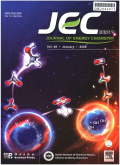- 钛学术文献服务平台 \
- 学术期刊 \
- 工业技术期刊 \
- 石油与天然气工业期刊 \
- 能源化学期刊 \
A comparative study on the reactivity of charged Ni-rich and Ni-poor positive electrodes with electrolyte at elevated temperatures using accelerating rate calorimetry
A comparative study on the reactivity of charged Ni-rich and Ni-poor positive electrodes with electrolyte at elevated temperatures using accelerating rate calorimetry
基本信息来源于合作网站,原文需代理用户跳转至来源网站获取
摘要:
The reactivity between charged Li(Li0.115Mn0.529Ni0.339Al0.017)O2(Li-rich),single crystal Li(Ni0.8Mn0.1Co0.1)O2(SC-NMC811),LiFePO4(LFP)and LiMn0.8Fe0.2PO4(LMFP)positive electrodes at different states of charge(SOCs)and traditional carbonate-based electrolyte at elevated temperatures is systematically studied using accelerating rate calorimetry(ARC).The results show that the SOC greatly affects the ther-mal stability of the Li-rich and SC-NMC811 when traditional carbonate-based electrolyte is used.Although an increase in the SOC increases the energy density of lithium-ion cells,it also increases the reactivity between charged Li-rich and SC-NMC811 samples with electrolyte at elevated temperatures.In comparison with SC-NMC811,the Li-rich samples are much more stable at elevated temperatures,and the latter have higher specific capacity.SC-NMC811 samples are less reactive than traditional poly-crystalline NMC811.Both LFP and LMFP samples show excellent thermal stability at elevated tempera-tures.The substitution of Fe by Mn in the olivine series positive materials does not impact the reactivity with electrolyte.

推荐文章
An experimental study of interaction between pure water and alkaline feldspar at high temperatures a
Alkaline feldspar
Autoclave
High-temperature and high-pressure experiments
SHS法合成TiC/Ni及Ni60+TiC/Ni粉亚音速火焰喷涂
自蔓延
亚音速火焰喷涂
颗粒
磨损
Ni-P-(Ni/SiC)P化学复合镀层的研究
化学镀
(Ni/SiC)p
镀层
硬度
Distribution and assessment of hydrogeochemical processes of F-rich groundwater using PCA model: a c
Fluoride
Groundwater chemistry
PCA model
Hydrogeochemical processes
Yuncheng Basin
内容分析
关键词云
关键词热度
相关文献总数
(/次)
(/年)
引文网络
引文网络
二级参考文献 (0)
共引文献 (0)
参考文献 (0)
节点文献
引证文献 (0)
同被引文献 (0)
二级引证文献 (0)
2021(0)
- 参考文献(0)
- 二级参考文献(0)
- 引证文献(0)
- 二级引证文献(0)
引文网络交叉学科
相关学者/机构
期刊影响力
能源化学
主办单位:
中国科学院大连化学物理研究所
中国科学院成都有机化学研究所
出版周期:
双月刊
ISSN:
2095-4956
CN:
10-1287/O6
开本:
出版地:
大连市中山路457号
邮发代号:
创刊时间:
语种:
eng
出版文献量(篇)
2804
总下载数(次)
0
总被引数(次)
7996
期刊文献
相关文献
推荐文献
- 期刊分类
- 期刊(年)
- 期刊(期)
- 期刊推荐
一般工业技术
交通运输
军事科技
冶金工业
动力工程
化学工业
原子能技术
大学学报
建筑科学
无线电电子学与电信技术
机械与仪表工业
水利工程
环境科学与安全科学
电工技术
石油与天然气工业
矿业工程
自动化技术与计算机技术
航空航天
轻工业与手工业
金属学与金属工艺
能源化学2022
能源化学2021
能源化学2020
能源化学2019
能源化学2018
能源化学2017
能源化学2016
能源化学2015
能源化学2014
能源化学2013
能源化学2012
能源化学2011
能源化学2010
能源化学2009
能源化学2008
能源化学2007
能源化学2006
能源化学2005
能源化学2004
能源化学2003
能源化学2002
能源化学2001
能源化学2021年第9期
能源化学2021年第8期
能源化学2021年第7期
能源化学2021年第6期
能源化学2021年第5期
能源化学2021年第4期
能源化学2021年第3期
能源化学2021年第2期
能源化学2021年第12期
能源化学2021年第1期

 免费查重
免费查重










